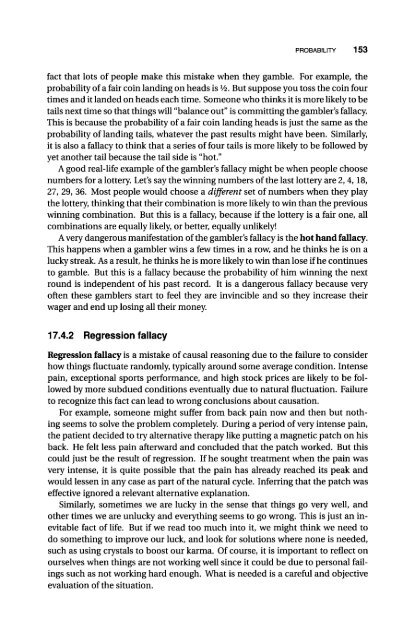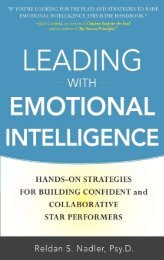An Introduction to Critical Thinking and Creativity - always yours
An Introduction to Critical Thinking and Creativity - always yours
An Introduction to Critical Thinking and Creativity - always yours
You also want an ePaper? Increase the reach of your titles
YUMPU automatically turns print PDFs into web optimized ePapers that Google loves.
PROBABILITY 153<br />
fact that lots of people make this mistake when they gamble. For example, the<br />
probability of a fair coin l<strong>and</strong>ing on heads is V2. But suppose you <strong>to</strong>ss the coin four<br />
times <strong>and</strong> it l<strong>and</strong>ed on heads each time. Someone who thinks it is more likely <strong>to</strong> be<br />
tails next time so that things will "balance out" is committing the gambler's fallacy.<br />
This is because the probability of a fair coin l<strong>and</strong>ing heads is just the same as the<br />
probability of l<strong>and</strong>ing tails, whatever the past results might have been. Similarly,<br />
it is also a fallacy <strong>to</strong> think that a series of four tails is more likely <strong>to</strong> be followed by<br />
yet another tail because the tail side is "hot."<br />
A good real-life example of the gambler's fallacy might be when people choose<br />
numbers for a lottery. Let's say the winning numbers of the last lottery are 2,4,18,<br />
27, 29, 36. Most people would choose a different set of numbers when they play<br />
the lottery, thinking that their combination is more likely <strong>to</strong> win than the previous<br />
winning combination. But this is a fallacy, because if the lottery is a fair one, all<br />
combinations are equally likely, or better, equally unlikely!<br />
A very dangerous manifestation of the gambler's fallacy is the hot h<strong>and</strong> fallacy.<br />
This happens when a gambler wins a few times in a row, <strong>and</strong> he thinks he is on a<br />
lucky streak. As a result, he thinks he is more likely <strong>to</strong> win than lose if he continues<br />
<strong>to</strong> gamble. But this is a fallacy because the probability of him winning the next<br />
round is independent of his past record. It is a dangerous fallacy because very<br />
often these gamblers start <strong>to</strong> feel they are invincible <strong>and</strong> so they increase their<br />
wager <strong>and</strong> end up losing all their money.<br />
17.4.2 Regression fallacy<br />
Regression fallacy is a mistake of causal reasoning due <strong>to</strong> the failure <strong>to</strong> consider<br />
how things fluctuate r<strong>and</strong>omly, typically around some average condition. Intense<br />
pain, exceptional sports performance, <strong>and</strong> high s<strong>to</strong>ck prices are likely <strong>to</strong> be followed<br />
by more subdued conditions eventually due <strong>to</strong> natural fluctuation. Failure<br />
<strong>to</strong> recognize this fact can lead <strong>to</strong> wrong conclusions about causation.<br />
For example, someone might suffer from back pain now <strong>and</strong> then but nothing<br />
seems <strong>to</strong> solve the problem completely. During a period of very intense pain,<br />
the patient decided <strong>to</strong> try alternative therapy like putting a magnetic patch on his<br />
back. He felt less pain afterward <strong>and</strong> concluded that the patch worked. But this<br />
could just be the result of regression. If he sought treatment when the pain was<br />
very intense, it is quite possible that the pain has already reached its peak <strong>and</strong><br />
would lessen in any case as part of the natural cycle. Inferring that the patch was<br />
effective ignored a relevant alternative explanation.<br />
Similarly, sometimes we are lucky in the sense that things go very well, <strong>and</strong><br />
other times we are unlucky <strong>and</strong> everything seems <strong>to</strong> go wrong. This is just an inevitable<br />
fact of life. But if we read <strong>to</strong>o much in<strong>to</strong> it, we might think we need <strong>to</strong><br />
do something <strong>to</strong> improve our luck, <strong>and</strong> look for solutions where none is needed,<br />
such as using crystals <strong>to</strong> boost our karma. Of course, it is important <strong>to</strong> reflect on<br />
ourselves when things are not working well since it could be due <strong>to</strong> personal failings<br />
such as not working hard enough. What is needed is a careful <strong>and</strong> objective<br />
evaluation of the situation.
















